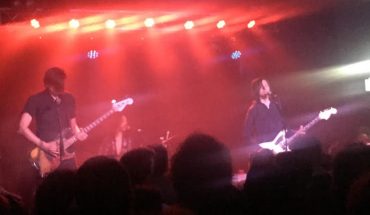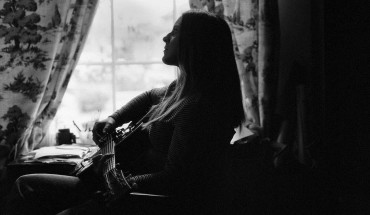The gentleman before me I’ve known for a while, his kindness and good humour known to many, but today a mantle of grief enfolds Lewis Wharton, a scant five months since the unexpected death of his friend and Little Barrie bandmate Virgil Howe on the eve of the band’s UK tour. But he and I are here to talk about the future. So we tell ourselves.
“I don’t remember a time when I didn’t want to be involved in music,” says Lewis. “I was watching videos as a kid when I hadn’t yet formed my musical tastes, and I used to watch concerts and think, ‘I want to do what they’re doing’.”
As the bass backbone of Little Barrie – whose five albums of power and beauty (We Are Little Barrie, 2005; Stand Your Ground, 2007; King Of The Waves, 2011; Shadow, 2014; and Death Express, 2017) have left an indelible high water mark on the rock idiom – Lewis has without doubt ended up doing ‘what they’re doing’.
He wears his achievements with self-effacing ease, but when did he first realise he was musical? “I’m not sure I am,” he laughs, “but it was always in the back of my mind when I was growing up that I should be doing this, playing music, but early on I didn’t have the bottle to pick up an instrument. I remember when I was 12, we’d go round to my mate’s house and pretend with tennis rackets because none of us had any instruments. I mean, you can do that at 12 and not think you’re mental.
“I finally got a guitar for Christmas because my parents could tell I was serious. It was a cheap Strat copy. Funnily enough, when I had my tennis racket I was a bass player. But I was a guitar man first.”
Lewis was born near Portsmouth in Hampshire and from there began his musical journey, playing in a band long before making the trek to London. “I sofa surfed in London for a bit when I first arrived. It was an exciting place to be back then in the late 1990s. Music and culture were vibrant.
“When I moved to London I didn’t play for ages. So I got more into record collecting and DJing, but I did drag my guitar around with me wherever I went without hardly ever playing it. I realised that if I didn’t play it I was going to forget how to, so I joined some mates’ bands as an outlet.”
Then one fateful day came the man who would help shape the course of his life up until this point. “In 2000 I was working in the record department of Merc on Carnaby Street when Barrie [Cadogan] came in to sell some 45s of his own. I was playing in other bands at that point and was thinking about getting into a band that I really wanted to be in. I remember the moment when I put his record on the turntable and thought ‘…shit, he’s beaten me to the punch’, because I was hearing exactly what I wanted to do, only better.”
This was Barrie’s early output including Wayne Fullwood on drums, a musical statement borne out of sheer love and an exuberance for driving, heartfelt funk and blues rock. Yet money and the making of it was a key determinant in the making of such music, an undeniable reality that even those of the most rose-tinted of views cannot fail to accept.
“If you can afford to live as a band, that’s when you all get good at playing,” says Lewis. “We used to rehearse in the basement of Barrie’s flat. Barrie had decided to get on with making music and started doing things for himself. People were coming into the shop and I was recommending his record to them. I was also giving it to promoters in London, just to let them hear it. I mean, that’s the thing, when you hear something so good you just want to pass it on. So when Barrie next came back in he asked if I wanted some more and said ‘Yep!’
“When Barrie finally moved down to London from Nottingham, he mentioned that he was looking for a bass player. So I went to a rehearsal, which was not that great actually. Wayne wasn’t sure of me, but Barrie had made up his mind.” How long did it take him to feel comfortable in the new band? “I don’t think you ever feel comfortable, but it’s true to say that by playing with Barrie I was forced to step up my game because Barrie, well, he can throw other musicians off their game because he just nails everything. He makes you try harder.
“But I was also suddenly aware that I really wanted to do this. Our initial band discussions were about us wanting to make something else happen, outside genre lines. We wanted to tap into audience energy. Our rehearsals were good fun but our first gig was big and was a bit of a hurdle. It was down in Plymouth on a club night and the audience was pretty big, but it was pure Spinal Tap going on because we couldn’t find the stage – which didn’t help my nerves. We only had about four or five songs at that point anyway but we got through it unscathed, and from that point onwards I felt much more comfortable doing it.”
The power trio that Little Barrie was, and may yet again be, god willing, had to be seen to be understood. A gig this writer was once lucky enough to enjoy in Lower Manhattan at Santos Party House found Barrie, Lewis and Virgil explode with faultless, raw precision before a stunned NYC crowd. It had been the final night of an East Coast tour when the musical telepathy between the three players was almost palpable.
“There was another gig I remember well. It was in Japan just after the disaster. We’d played a couple of cities first and then went and did Tokyo, and that was just something else. Japanese audiences can be quite reserved but at that gig they were just going nuts. And we were inciting them to get more involved. But the playing, for me, was incredibly weird. It was as if I couldn’t do anything wrong if I tried. I was playing and not even having to worry about it. I’d never seen a reaction like that before. I said to myself ‘this is better than any drug known to man’. When you’ve got a good audience, you can suck up all of their energy and give it all back. It’s a trade.”
But the future keeps beckoning and Lewis has yet to look it square in the eye. It’s still too soon: “We’ve just lost Virgil and he was a force of nature, as were Wayne and Billy [Skinner]. Little Barrie, like lots of bands, has been driven by its drummers… by Virgil.”
His eyes cloud as he remembers. He’s come unmoored for a brief moment, his grieving still all too apparent. “It’s the strangest experience I’ve ever had,” he says. “I’ve had family members pass away, but losing Virgil was like a bomb dropping. Everything changed. It felt as if I was in some other land or dimension. When I heard, I thought, this can’t be right, and like in a dream I was looking for a key to make everything go back to normal… but that doesn’t happen.”
But then he smiles at the memory of his friend. “Virgil and I were good mates. We talked shit, a lot, and got to know each other on another level. We were very different people, but yeah, losing him has been the most shocking thing in my life so far. But how am I coping? I just am. You just do. And his funeral, I’ve never not wanted to go to something so much, because that would have been like being forced to accept it. Virgil was such a positive person. He was determined to enjoy himself at every possible opportunity. And his mindset was, ‘Why wouldn’t I?’ He had a lust for life. I think about him every day. What has happened has proved to me that a person’s spiritual force can live beyond the physical reality.
“But the band is in a strange place at the moment. It’s a difficult place to navigate from, but I know that Virgil would want us to continue. Barrie is very focused on music, but now is the first time I’ve known Barrie to stop and ask ‘What do we do now?‘”
Lewis’s interests also stretch to painting and illustration – works he both exhibits and sells – to grass track racing. “I’m embracing my midlife crisis wholeheartedly, man, yeah,” he laughs. “Where I live now near Portsmouth, I have a little studio for my artwork, which is something I couldn’t have in London. I’ve also got a lot of garage space for my bikes.
“My tastes now are more eclectic, but the scenes I was interested in back in London in the Nineties don’t exist anymore, I don’t think. The London trends now are quick and fragile, disappearing overnight. That’s just my guess. That somehow mainstream ‘hip’ media is driving subcultures.”
Creativity, therefore, and not a geographic appointment, is what keeps Lewis buoyant. “It’s hard work in London if you want to do something, but I’m close enough on the south coast to utilise the London outlets if I want to, and I know my way around London. But I’m from somewhere else and don’t have that attachment to the capital.
“I’ve always had dreams about what could be possible with music. If you can’t help but think about something, then you’re going to see it happen. The power lies in the subconscious. Dreaming about things can put you in a position that you really need to be in.
“At the same time, I’m in no way a shining light as a life coach.” So no ‘Lewis Wharton: Life Coach’ business cards any time soon? “Can you imagine? God help the planet. But there’s nothing that can bring you more satisfaction than a work ethic, a creative work ethic.” So his career is a dream come true? “Yeah, but also, be careful what you wish for. Because when I was on the outside of the music industry, I wanted to be in it. And now I’m in it, I know how it really is. Put it this way, it’s a very difficult place to exist, comfortably.
“But Little Barrie has always gone where it has gone. We’ve never had an agenda. But the answer as to where Barrie and I go from now lies in us both doing things… and in doing things, the answer will arrive.”
Jason Holmes
@JasonAHolmes
Photograph by Paul Lizamore





